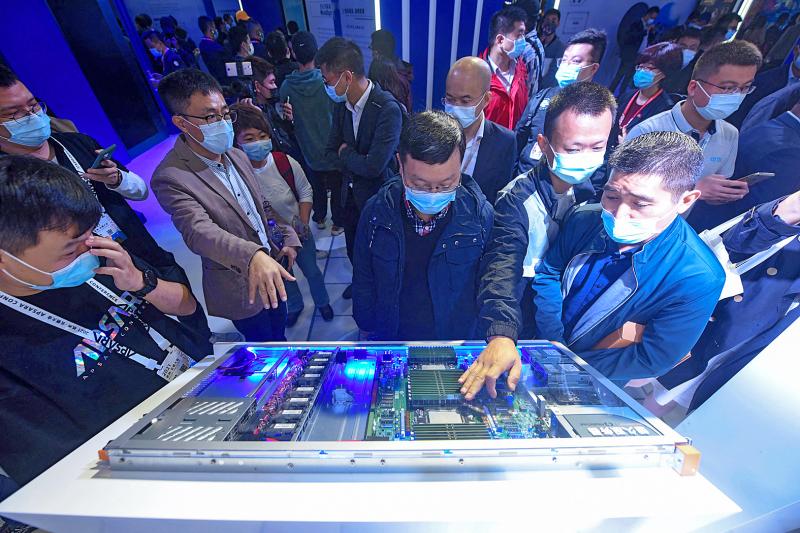Alibaba Group Holding Ltd (阿里巴巴) yesterday unveiled a new server chip that is based on advanced 5-nanometer technology, marking a milestone in China’s pursuit of semiconductor self-sufficiency.
The Chinese tech giant’s newest chip is based on micro-architecture provided by the SoftBank Group Corp-owned Arm Ltd, it said.
Alibaba, which is holding its annual cloud summit in Hangzhou, China, said that the chip is to be used in its own data centers in the “near future” and would not, for the time being, be sold commercially.

Photo: AFP
“Customizing our own server chips is consistent with our ongoing efforts toward boosting our computing capabilities with better performance and improved energy efficiency,” Alibaba Cloud Intelligence president Jeff Zhang (張劍鋒) said. “We plan to use the chips to support current and future businesses across the Alibaba Group ecosystem.”
Alibaba’s server chip is one of the most advanced yet by a Chinese firm, as it joins global rivals such as Amazon.com Inc and Google in gradually replacing silicon from traditional chipmakers like Intel Corp and Advanced Micro Devices Inc with products custom-designed for their data centers and workloads.
Alibaba is one of a number of Chinese firms that has answered Beijing’s call to invest in the development of cutting-edge technologies and manufacturing capacities.
The Arm-based server chip, known as the Yitian 710, is the third semiconductor introduced by the e-commerce giant since 2019, following an artificial intelligence chip and an Internet-of-Things chip.
However, with limited domestic semiconductor manufacturing capabilities, Alibaba would likely still need to outsource production. While the company did not disclose its manufacturing partner, Taiwan Semiconductor Manufacturing Co (台積電) and Samsung Electronics Co are the only two firms capable of mass-producing 5-nanometer chips.

MULTIFACETED: A task force has analyzed possible scenarios and created responses to assist domestic industries in dealing with US tariffs, the economics minister said The Executive Yuan is tomorrow to announce countermeasures to US President Donald Trump’s planned reciprocal tariffs, although the details of the plan would not be made public until Monday next week, Minister of Economic Affairs J.W. Kuo (郭智輝) said yesterday. The Cabinet established an economic and trade task force in November last year to deal with US trade and tariff related issues, Kuo told reporters outside the legislature in Taipei. The task force has been analyzing and evaluating all kinds of scenarios to identify suitable responses and determine how best to assist domestic industries in managing the effects of Trump’s tariffs, he

TIGHT-LIPPED: UMC said it had no merger plans at the moment, after Nikkei Asia reported that the firm and GlobalFoundries were considering restarting merger talks United Microelectronics Corp (UMC, 聯電), the world’s No. 4 contract chipmaker, yesterday launched a new US$5 billion 12-inch chip factory in Singapore as part of its latest effort to diversify its manufacturing footprint amid growing geopolitical risks. The new factory, adjacent to UMC’s existing Singapore fab in the Pasir Res Wafer Fab Park, is scheduled to enter volume production next year, utilizing mature 22-nanometer and 28-nanometer process technologies, UMC said in a statement. The company plans to invest US$5 billion during the first phase of the new fab, which would have an installed capacity of 30,000 12-inch wafers per month, it said. The

Taiwan’s official purchasing managers’ index (PMI) last month rose 0.2 percentage points to 54.2, in a second consecutive month of expansion, thanks to front-loading demand intended to avoid potential US tariff hikes, the Chung-Hua Institution for Economic Research (CIER, 中華經濟研究院) said yesterday. While short-term demand appeared robust, uncertainties rose due to US President Donald Trump’s unpredictable trade policy, CIER president Lien Hsien-ming (連賢明) told a news conference in Taipei. Taiwan’s economy this year would be characterized by high-level fluctuations and the volatility would be wilder than most expect, Lien said Demand for electronics, particularly semiconductors, continues to benefit from US technology giants’ effort

‘SWASTICAR’: Tesla CEO Elon Musk’s close association with Donald Trump has prompted opponents to brand him a ‘Nazi’ and resulted in a dramatic drop in sales Demonstrators descended on Tesla Inc dealerships across the US, and in Europe and Canada on Saturday to protest company chief Elon Musk, who has amassed extraordinary power as a top adviser to US President Donald Trump. Waving signs with messages such as “Musk is stealing our money” and “Reclaim our country,” the protests largely took place peacefully following fiery episodes of vandalism on Tesla vehicles, dealerships and other facilities in recent weeks that US officials have denounced as terrorism. Hundreds rallied on Saturday outside the Tesla dealership in Manhattan. Some blasted Musk, the world’s richest man, while others demanded the shuttering of his